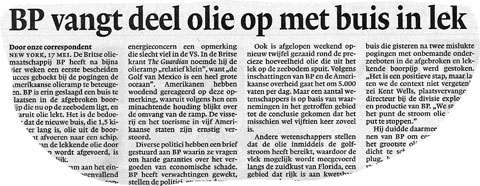This is approximately twenty percent of the leaking oil. The company inserted a long tube, connected to a tanker at the surface, into the larger of the two leaks.
This siphoned oil is however mixed with water and therefore worth less money. Will BP still process this oil in refineries or does it regard the oil as chemical waste? Moreover, what will the company do with the oil that is still accumulating rapidly on the ocean surface?
In answer to an email inquiry, a BP spokesperson said ’the oil will be shipped to a Gulf Coast refinery and put into the refinery system, where it will be treated as off-spec crude’. Off-spec crude is oil of lesser quality. The spokesperson went on to say that this is also the case for the oil BP recuperates from the source at the bottom of the ocean, as well as the oil the company recuperates from the sea surface and the oil it recovers from the beaches.
Associate professor of oil refinery, Michiel Makkee (faculty of Applied
Sciences), is not surprised that BP wants to refine all the oil: “It’s no problem whatsoever to process the oil.”
Makkee’s opinion is the complete opposite of that of Dave Salt, a researcher at the British Institute Oil Spill Response. He doesn’t believe a word BP says about refining the oil it collects from the ocean surface and beaches.
“Normally, owing to the difference in density, you can easily separate oil and seawater from each other”, Salt says. “But in this case the two are so severely mixed that they’ve become an emulsion, which explains the orange colour of the spill. If you want to separate them from one another in that stage, you either have to heat the mixture or add some chemicals.”
According to Salt, the oil, which has been floating on the sea surface, is not worth the effort because it has deteriorated. “The more volatile fraction has evaporated”, he says, “and there is a lot of salt in the oil. Refineries are not used to processing such bad quality.”
Makkee agrees that the oil is of bad quality. “But”, he says, “there are refineries that can process any slush into high quality fuel. It just takes more effort. The company will calculate what the most cost-effective treatment is. If processing in a refinery is too expensive, it will treat the oil as chemical waste and have it burned in waste treatment plants, where it can be used to generate electricity.”
Studeer je in het buitenland, dan krijg je alleen studiefinanciering wanneer je minstens drie van de zes jaar vóór inschrijving in Nederland woonde. Als bachelorstudent is aan die eis nog te voldoen, maar wil je na je bachelor ook een buitenlandse master volgen, dan wordt het moeilijk. Stel, je studeert in de Verenigde Staten. Een bacheloropleiding duurt daar vier jaar. Als je daarna nog wilt doorsturen, kun je dus onmogelijk aan de drie-uit-zes-eis voldoen.
Minister Plasterk vindt dat onterecht. ‘De tijd die in het buitenland wordt doorgebracht om te studeren zou niet mee moeten tellen voor de toepassing van de regel’, schrijft hij vandaag. De minister wil wettelijk vastleggen dat de drie-uit-zes-regel geen belemmering mag vormen om in het buitenland een bachelor én master te volgen. Hij heeft de IB-Groep gevraagd de regel alvast zo toe te passen.



Comments are closed.